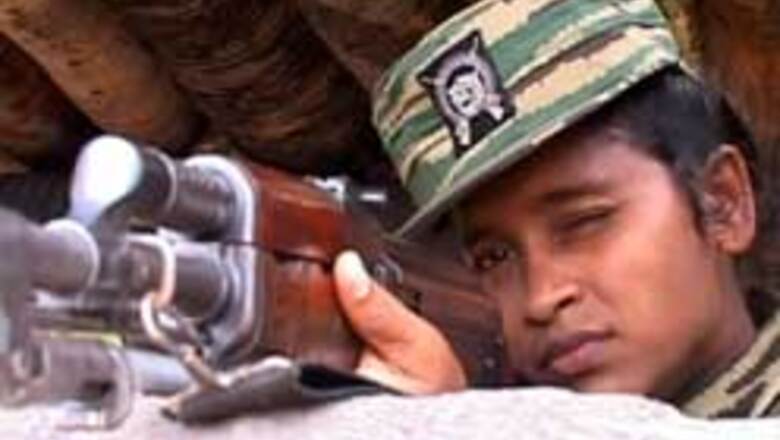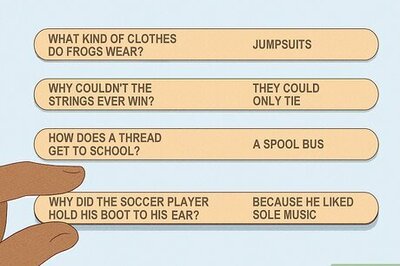
views
Geneva: The Sri Lankan government and Tamil Tiger rebels failed to reach a breakthrough in a new round of peace talks in an atmosphere clouded by new tensions in the Indian Ocean island nation.
Weekend talks concluded Sunday without the two sides even agreeing on a date for a new meeting, said Erik Solheim, Norway's minister for international development who was leading the negotiations.
Hopes were slim from the outset that a 2002 cease-fire could be revived, with both sides refusing to give way on key issues, including the route by which aid supplies could travel to the northern Jaffna Peninsula.
''No agreement was reached by the parties on how to address the humanitarian crisis,'' Solheim told reporters.
Sri Lanka's Health Minister Nimal Siripala de Silva, who led the government delegation, said the government offer of a sea route was cheaper and more efficient, but that the rebels refused.
''The ball is in the LTTE's court,'' he said referring to the rebels by their formal name, Liberation Tigers of Tamil Eelam.
The LTTE said in a statement that allowing humanitarian supplies to pass along the closed highway was a precondition for future talks, adding that sea access would not provide sufficient relief to the Jaffna region which has been cut off by fierce fighting, leaving thousands without food and other essential supplies.
''Closure of the A9 highway has resulted in an open prison for more than 600,000 people,'' the LTTE said.
The government indicated earlier during the talks that it was worried the LTTE, which is banned in Canada, the United States, the European Union and India, would use the highway to raise funds for their cause.
Rohitha Bogollagama, Sri Lanka's development minister and delegate at the talks, told The Associated Press that the rebels would profit from aid trucks going through their territory.
''One of the factors that has to be taken into account is the practice of the LTTE of levying extortionate fees on transport through the areas that they control,'' Bogollagama said.
In an attempt to present at least one successful outcome of the talks, Solheim praised both sides for assuring Norwegian mediators that they would refrain from launching any new offensives. But he warned that ''the proof of that pudding is in the eating.''
Earlier Sunday a Tamil Tiger delegate had warned of ''serious consequences'' if the island nation's military advances while negotiations are under way.
PAGE_BREAK
''Our troops along the Northern Province defense line noticed a heavy military presence, and informants tell us they have imposed a curfew along the defense line,'' the rebels' military spokesman, Rasiah Ilanthirayan, told the AP. ''This is usually done in preparation for military operations. We are very disappointed by the actions of the government. Exploitation ... for military advancement can cause serious consequences.''
Ilanthirayan did not spell out what the consequences of military action might be.
He said shelling took place overnight in Muhamalai, Kilali and Nagarkovil villages along a line that divides government and rebel territories in the northern Jaffna peninsula.
In Sri Lanka the military said one Tamil Tiger rebel and five civilians were killed Sunday when a bomb allegedly carried by the guerrilla exploded prematurely in Udupiddy village, on the northern Jaffna peninsula, 300 kilometers (185 miles) north of the capital, Colombo.
The military said on its Web site that suspected Tamil Tigers attacked a Special Task Force camp late Saturday in the eastern district of Ampara and that the elite forces retaliated, killing two insurgents. Earlier in the day, the military had said militants shot and killed a soldier and wounded six police officers in bomb attacks in the north and east.
More than 2,000 soldiers, rebels and civilians have been killed since the cease-fire collapsed last year, and the international community has been urging government and rebel leaders to step up efforts to end the 23-year civil war.
Overall more than 65,000 people have been killed since the Tigers began fighting for an independent homeland in northern and eastern Sri Lanka in 1983.
At the opening of the talks, Norway's Solheim said the Sri Lankan people and the international community were growing impatient for peace.
But neither side appears willing to make concessions at this stage, with the government saying the Tigers must lay down their arms and engage in a political process, and the LTTE accusing the government of waging an ''undeclared war'' against Tamils.
Heavy shelling in north Sri Lanka after talks fail
Heavy artillery shelling resumed in northern Sri Lanka on Monday just hours after peace talks between the government and Tamil Tigers collapsed, triggering fears of a deepening civil war.
Residents in the army-held Jaffna peninsula said fierce shelling began before dawn, an eerie reminder of months of fighting that killed hundreds of civilians, troops and rebel fighters in the run-up to the talks in Geneva.
















Comments
0 comment